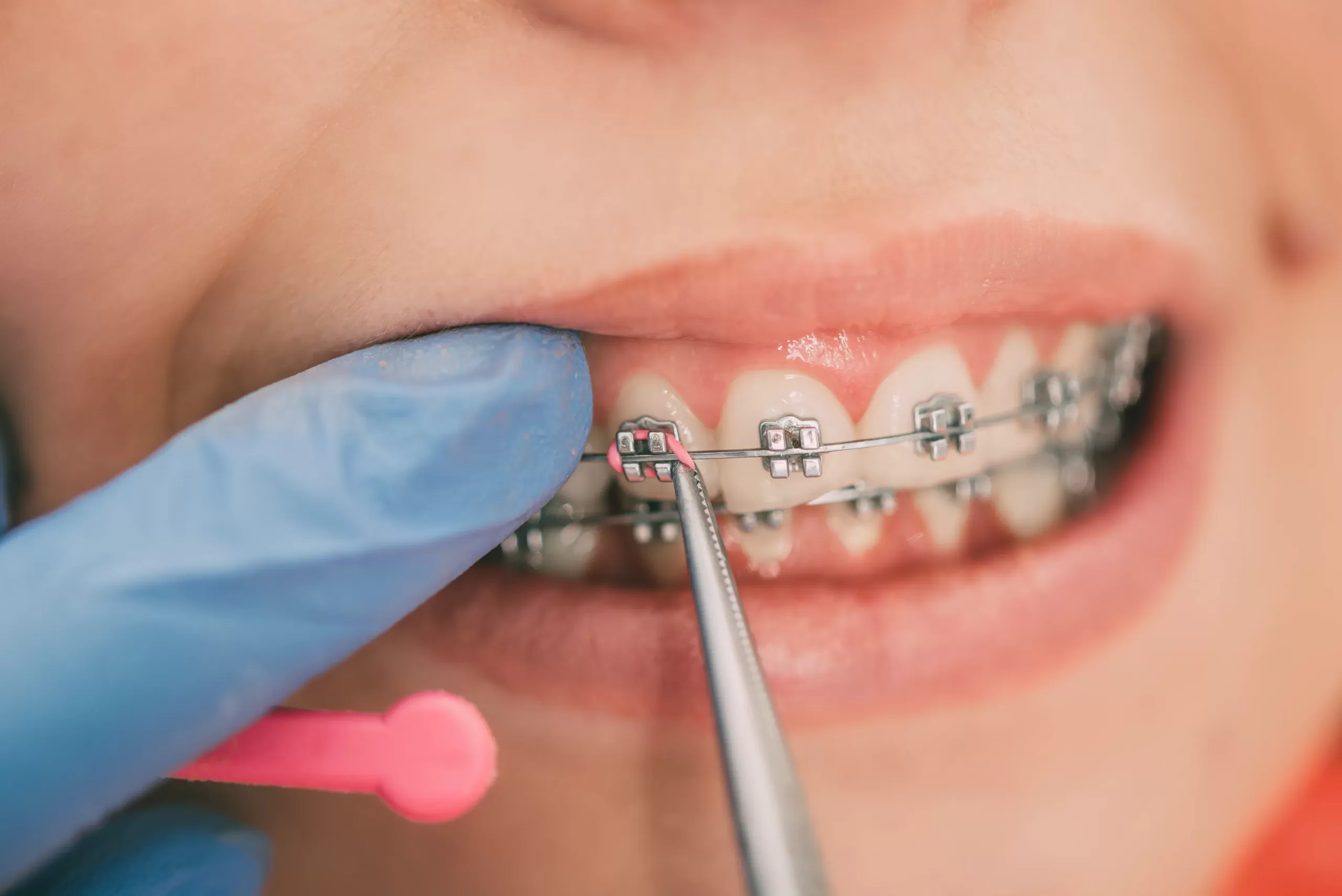Braces can help correct crowded teeth, not only improving your smile but also helping prevent cavities because there’s nowhere for plaque to hide.
Even though most people obtain braces as children or adolescents, adults can also benefit from them.
Modern braces apply constant pressure to help move teeth in an effective way, however it’s crucial that you follow your orthodontist’s instructions and attend regularly scheduled visits in order to reduce treatment times and stay within an acceptable timeline.
Improved Oral Hygiene
Misaligning teeth makes it more challenging to brush and floss them properly, which leads to an accumulation of bacteria and food debris in the mouth which can lead to tooth decay and gum disease. Straightening them with braces reduces this problem because toothbrush bristles can reach parts that crookedness misses; additionally, this also helps avoid long-term dental complications like recession and excessive wear due to clenching or grinding of the teeth.
Maintaining proper oral hygiene is crucial, particularly for people wearing braces. This is because their hardware tends to trap more dirt, food particles, and bacteria than normal mouths do, leading to gum disease, tooth decay, or other serious consequences if ignored properly. Therefore it’s crucial for those with or planning on wearing braces to adopt healthy cleaning habits and stay on top of proper maintenance regimen.
Braces that are less noticeable, such as ceramic braces, can provide adults with a way to improve the aesthetics of their smile or alignment of teeth without becoming visible to others. Ceramic braces feature translucent material that blends into teeth seamlessly for less noticeable treatment than traditional metal braces; making it an excellent solution for anyone concerned with cosmetic concerns about their smile or unhappy with current alignment of their teeth.
Additionally, braces help improve oral hygiene by reducing friction between the teeth and soft tissues such as the tongue and cheek. Friction can cause irritation and inflammation that leads to tissue loss in the mouth over time. Furthermore, overlapping teeth create pockets where bacteria hide out that contribute to tooth decay and gum disease – but braces can fix these problems by reducing overlapped teeth and helping all your teeth bite together more evenly.
If you are considering braces, it’s essential that you visit a dentist who specializes in orthodontics for best results and minimum discomfort during the process. Regular check-ins with your dentist will allow them to identify potential issues early and intervene before they become serious issues.
Clearer Speech
If you find it difficult to pronounce certain words due to a lisp, stutter, or any other speech impediments, braces can help. By shifting problem teeth in alignment with your jaw and lips, this treatment allows your tongue to articulate sounds more freely without difficulty.
Misalignments can make chewing difficult, leading to digestive issues. Food may not break down correctly when teeth aren’t aligned correctly; braces can assist by aligning jaw and bite correctly and decreasing chances of digestive issues.
Braces can help you pronounce certain sounds more clearly, such as the /s/ and /z/ of the alphabet, by eliminating gaps between your teeth that contribute to whistling or slurring words. They may also shift jaw or tooth positioning for greater room for tongue maneuverability when speaking – making it easier to formulate words without slurring or whistling!
After you first put on braces, it is normal for your speech to seem different than usual for several days afterward. This should resolve itself within a week or so without intervention; otherwise speak with your orthodontist about using braces wax so your tongue glides smoothly over the brackets. Also try reading out loud aloud or engaging in regular conversations to help adjust to them more quickly.
Metal braces can be an effective and discreet treatment option to address misalignments that inhibit speaking due to their strength and efficiency. Metal braces work quickly to shift your teeth back into their proper positions while modern technology makes them smaller for increased comfort – providing more effective care in an unobtrusive fashion.
Less Eroding Bones and Tissues
Straight teeth can help enhance your smile and boost confidence in yourself and in others, but having misalignments may cause serious oral health issues like gum recession and bone erosion. Orthodontic treatments like braces are available to correct misalignments of misaligning teeth as well as relieve any pressure placed upon jawbone and gum tissues that cause these issues.
Over time, bacteria-laden plaque and food debris may accumulate on crooked teeth, leading to gum disease. Braces can help correct such problems along with others such as cavities, periodontal disease and more.
Teeth that are properly aligned can assist your digestion by making it easier to chew and break down foods, enabling you to absorb more nutrients from your diet while preventing future issues with indigestion or heartburn.
Misaligning teeth can result in an abnormal bite that alters how you eat and contribute to weight gain and malnourishment over time. Straightening the bite helps you chew better for healthy digestion while decreasing stomachaches, heartburn, or any other digestive-related complications.
Traditional braces consist of metal brackets with wires tightened to apply constant pressure to various areas of the mouth, forcing ligaments and bones to stretch or compress, stimulating bone breakdown and moving the teeth into their proper places. Nowadays, more subtle options such as clear, ceramic, plastic and metal braces that blend in better are also available as less visible solutions.
Your dentist may recommend lingual braces, which attach on the inside of the teeth so they’re less visible to others. There are fixed or removable models to meet your individual preferences.
No matter which kind of braces you select, they all aim to improve jaw and bite alignment as well as promote healthy dental development. This makes it easier to clean, brush and floss teeth while protecting them against damage in the long run.
Better Self-Esteem
Braces can do more than improve oral health and quality of life; they’re also an empowering confidence boost for children, teens, and adults. Being confident makes someone much more likely to take care of themselves and find new opportunities; many who were once self-conscious about their smile find that once they have one with straighter and more beautiful teeth they become better equipped for success in life.
As confidence levels increase, social situations, first dates, and job interviews become more likely. When teens or adults feel confident, they’re more likely to speak up and put themselves out there even during stressful situations – which is why orthodontic treatment may have many positive impacts on confidence levels. While we do not advise braces solely as a means of building up one’s self-confidence levels.
Traditional braces and Invisalign invisible braces work to straighten misalignments between crowded teeth and jaws to create a balanced bite and more pleasing smile. This can have a profound effect on a person’s self-esteem, especially if they were previously reluctant to smile or speak up in certain social or professional situations. Most patients who receive braces report feeling transformed after finishing their straightening process; their beautiful, healthy smile allows them to take on new situations more freely and confidently than before!
Braces don’t just enhance the appearance of your smile; crooked or spaced-out teeth make it harder to clean, trapping food debris and bacteria that lead to cavities or tooth decay. By fixing this issue with braces, they make keeping teeth clean easier, which leads to healthier smiles you’re more likely to show off!
People often fear braces, yet many who decide to get them find that it was one of the best investments they ever made for themselves. To ensure a healthier, happier, more confident smile it is wise to consult with a certified orthodontist about when and what type of braces will best serve your needs – contact Delaware Smile Center now for your consultation appointment!
Disclaimer: The content on this blog is intended for general informational purposes only. It is not a substitute for professional medical advice, diagnosis, or treatment. Always consult qualified healthcare providers for personalized advice. Information regarding plastic surgery, dental treatment, hair transplant, and other medical procedures is educational and not a guarantee of results. We do not assume liability for actions taken based on blog content. Medical knowledge evolves; verify information and consult professionals. External links do not imply endorsement. By using this blog, you agree to these terms.





